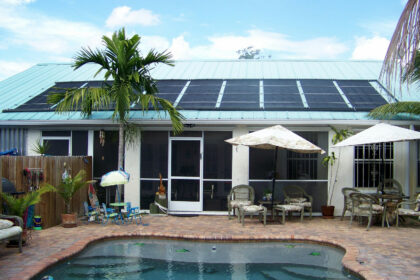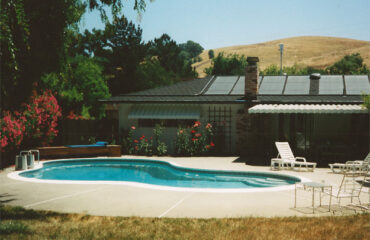
Contrary to popular belief, there is actually ample amount of solar energy to warm your pool even during the winter season and in the cold Northeast. Solar pool heating is an environmentally conscious and cost efficient way to do just that. A solar pool heater offers reduced recreational pool heating costs, as well as maintain water temperatures in fairly high levels.
By installing a solar-powered swimming pool heater, you can significantly minimize your annual operating costs, as it requires little maintenance and lasts longer than gas and heat pump swimming pool heaters.
A typical solar pool heating system includes:
Solar collector – this is where the pool water is circulated so it can be heated using the sun’s energy.
Filter – the use of a solar pool heating filter is pretty much the same as any other filter: it removes pollutant. A filter eliminates debris from the water prior to it being pumped through the solar collector.
Pump – a device that circulates pool water through the solar collector, and back in the pool.
Flow control valve – this diverts water through the collector either automatically or manually.
How Does a Solar Pool Heating System Work?
With the help of the pump, the pool water goes through the filter, and then the solar collector, where the water heating process occurs. Once the water reaches the desired temperature level, it is then pumped back to the pool. During peak summer months, a solar collector can also be used to cool pool water by circulating the water at night. If the temperature of the solar collector is the same as the temperature of the pool, however, the water just bypasses the system and goes back to the pool.
Solar collectors can be made out of several kinds of materials, depending on how you intend to use it, and on your climate. You may need an unglazed solar collector system if you only plan on using the solar pool heating system when the temperature levels are above freezing. Otherwise, a glazed collector system might be a more ideal option. Although more expensive, a glazed solar collector system captures solar heat better in colder weather than an unglazed collector system.
Whether you are rooting for the glazed or the unglazed system, both types of collector should have freeze protection if they will be utilized in colder conditions.
Choosing a Heating System
In general, a solar pool heating system’s cost range between $3,000 and $4,000. The payback would depend on the cost of your local fuel, but typically it’s about one and half to seven years. Moreover, it is more durable as compared to heat pump and gas pool heaters.
Prior to purchasing and installing a solar pool heating system, it is vital to keep the following considerations in mind:
- Determine the size, and efficiency of the system you are going to purchase.
- Evaluate your solar resource.
- Compare prices.
- Know the local regulations and codes regarding solar energy matters.
If you are unable to determine your site’s solar source, you can contact your solar energy system supplier so they can have the site analyzed.


